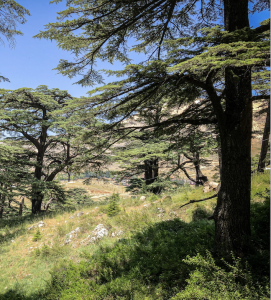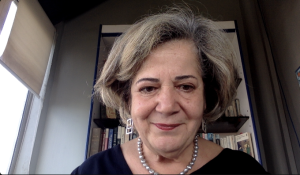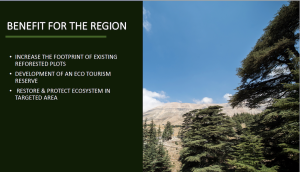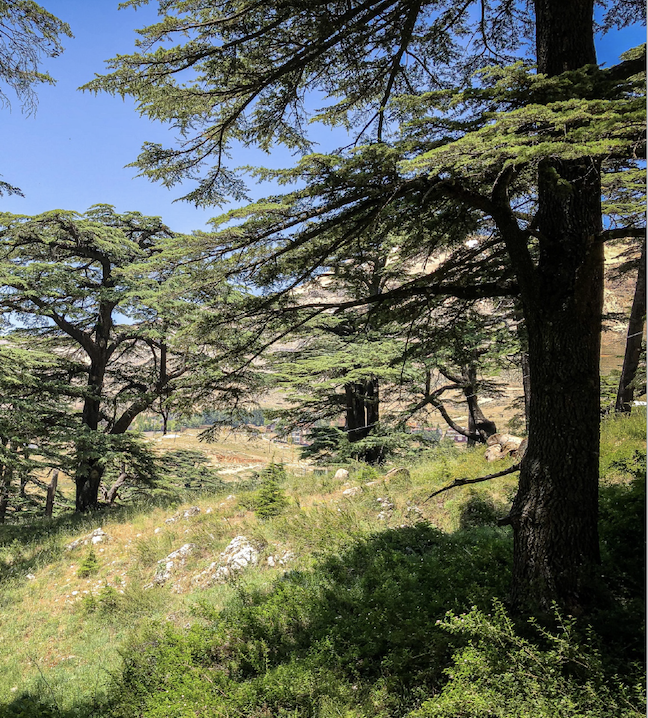by Ariel Miller

Arid, deforested slopes are visible behind this grove of cedars on the slopes of Mt. Lebanon
Lebanese Rotarians are racing to qualify for a global grant to plant a cedar forest on dessicated land on the slopes of Mount Lebanon this fall. The project will protect the region’s priceless biodiversity and boost eco-tourism. Called Arztak Hawytak (“Your Cedar, Your Stamp”), it is rooted in love for their country and hope for its recovery from violence, disaster, and diaspora.
Lebanon has suffered the loss of 80% of its forests, a trend exacerbated by massive wildfires last summer. But the Rotary project team embraces the long view. “The cedar is the symbol of our identity and our resilience,” says Samar Salman, District 2452 Environmental Chair, who is leading the campaign to plant and nurture 4,000 cedars on land donated by the resort town of Ehden on the slopes of Mount Lebanon. “If the seedlings survive the first three years, they can live for 600 years. Tomorrow has to be built today. Tomorrow is too late.”

Samar Salman describing the Arztak Hawytak reforestation project
Her club and district are taking on this cause despite appalling setbacks, including the 2020 explosion in the Port of Beirut which caused at least $15 billion in property damage and left hundreds of thousands of people homeless. The Rotary Clubs of Beirut raised funds to help rebuild four hospitals, including the restoration of an intensive care unit. Hard on the heels of this disaster, the nation has endured an 162% inflation rate over the past year, 208% in food costs.
Nevertheless, Lebanese Rotarians have succeeded in raising funds for Arztak Hawytak from their clubs, district, Zone, and the business community. Samar Salman’s club, Beirut Cadmos is partnering with ESRAG Past Chair Christopher Puttock’s Rotary Club of Honolulu in the quest to complete the fundraising. Donations from clubs in as many districts as possible would maximize the 80% Rotary Global Grant match for District Designated Funds (DDF). The project team needs $35,000 in DDF to reach the project budget of $102,880.
Pledges in the next few weeks will be vital to qualifying for a global grant by fall, taking into account the fact that Rotary Foundation grant review typically pauses in summer during the change-over in leadership. Planting has to start by November for optimal seedling survival, or the project needs to be postponed for another year.
85% of the funding will go towards buying, planting, and irrigating cedar seedlings in partnership with local nurseries and workers, providing an immediate economic benefit to the community. 15% will go into environmental education for children and other community residents. “Lebanon is in survival mode,” Salman explains. “Environmental education is not part of the curriculum.” Most households only get access to electricity for an hour a day, but she reports that the country has made almost no investment in solar generation, which would provide clean and dependable power. Salman, whose marketing firm works to help clients build sustainability into their business plans, sees climate solutions education as crucial to ensuring that Lebanon’s next generation understands that sustainability is essential to the country’s survival, from food security to tourism.

A slide from Samar Salman’s presentation about the global grant project
Ehden is a vacation destination beloved by generations of Lebanese, European, and Arab families. They continue to come, drawn by the natural beauty and the town’s famous cultural festivals and gastronomy. The cedar forests of the Horsch Ehden Nature Reserve provide the habitat for nearly 40% of Lebanon’s native plant species and scores of indigenous mammals, birds, amphibians and reptiles, many of them endangered. A reforestation plot begun in 2012 above the town has 8,380 young cedars and a 90% survival rate. The land donated to the Rotary project will leverage the ecological and economic benefits of the reserve. New hotels are being built, and the municipality is training eco-tourism guides.
Rotarians have partnered with Bank Bemo to set up an online platform, SustainLebanon.org, through which donors can adopt trees. Celebrated Lebanese actor and environmental activist Georges Khabbaz has agreed to serve as the Project Ambassador. The planting, irrigation, and nurture of the seedlings will be managed by the nonprofit Jouzour Loubnan, which has already planted nearly 400,000 trees in arid regions across Lebanon. The project team launched Arztak Hawytak social media pages on LinkedIn, Facebook, Twitter, Instagram, and YouTube. The United Nations Global Compact Network, which encourages sustainable businesses, will be promoting the project internationally.
The Lebanese diaspora are homesick for their beautiful homeland, Samar reports. Because they’re using other currencies than the inflation-plagued Lebanese lira, they and other travelers from abroad can easily afford a trip to Ehden. It’s also a popular choice for Lebanese families who can no longer travel outside the country.
After detailing the many challenges ahead, Samar Salman explains how Lebanon’s hope for a vibrant future is rooted in the restoration of its cedar forests. Her face lights up with irrepressible joy. “As Gebran Khalil Gebran said: ‘a cedar yields, but never falters.’ For all Lebanese,” she explains, “the cedar is not just a tree: it is the symbol of patriotism, resilience, pride, and a constant reminder of their roots.”

